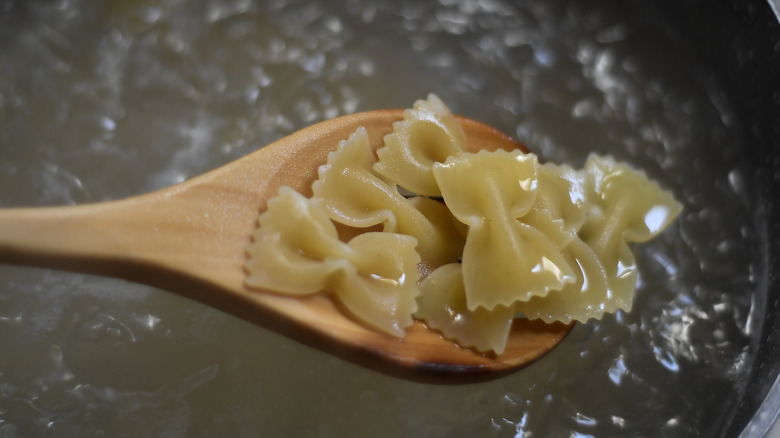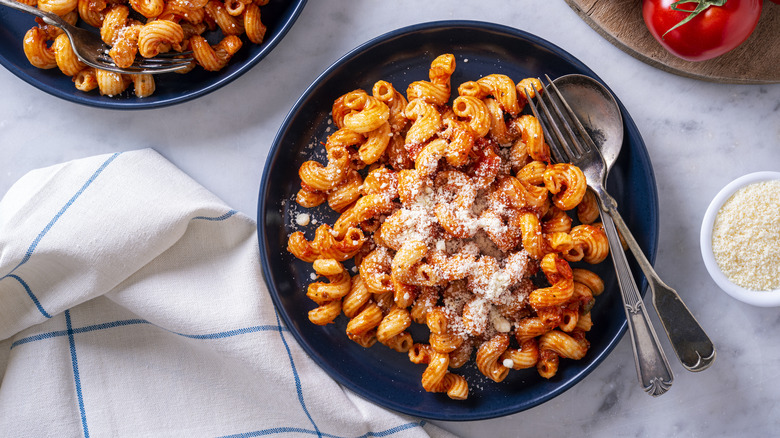Alton Brown's Cold Water Pasta Method Cuts Your Cooking Time In Half
For one of the most basic, ubiquitous foods in existence, pasta has a surprising number of rules to follow in order to achieve the best possible results. You shouldn't use more water than you need (just enough to cover the pasta); make sure to salt the water heavily (it should taste like the ocean); keep the pasta very slightly al dente so it's not mush — there's a lot to remember. Another thing that seemingly everyone can agree on is that the central part of the cooking process happens by boiling a big pot of water, then dumping the pasta into it.
But what if there was an even easier, quicker way to do it? That's the question Alton Brown asked himself; the culinary personality found his answer in an alternative method: Instead of heating up the water first, start the pasta in the water while it's still cold and then bring it to a boil. The approach not only shortens the total cook time, it also helps the finished dish come together. This technique only works on shorter pasta shapes, though, as it calls for a smaller-than-usual amount of water (½ gallon per 16-ounce box of dry pasta, which amounts to around 1½ inches in a standard 8-quart pasta pot). However, it's great for noodles like farfalle or cavatappi.
Alton Brown has learned to embrace this method
Alton Brown freely acknowledges that this technique — which he first debuted in 2015 — is sacrilege: "I may be blocked from ever entering Italy again for saying this," he notes. And he himself has come a long way to get here. Way back during the first season of his classic Food Network show "Good Eats" in 1999, Brown was vehement about only cooking pasta in boiling water. However, at some point in the intervening decade and a half, his opinion shifted.
Even if it's not the traditional way, starting your pasta in boiling water has a lot going for it. First, it's much faster than the traditional method, as the pasta softens and begins to cook as the water itself heats up. Granted, you have to keep a bit of a weather eye on it this way, as commercial dry pasta generally has stated cooking times on the box, but those assume you're using boiling water. (For what it's worth, Brown says it will take around four and a half minutes, though depending on your stovetop, it may take a bit longer.) But as long as you pay attention, the technique is ideal for getting dinner ready a whole lot quicker. And there's another benefit: It leads to better sauces.
It improves pasta sauces
If you follow modern cooking trends, you probably know that pasta water is having a moment, and you shouldn't throw it away because it's extraordinarily useful. In fact, it's particularly effective when added as part of the sauce-making process since the starchy water both thickens sauces better compared to regular water and gives sauces a slight bit of tackiness that helps it stick to noodles. "May your marinara sauce never stick to your pasta" was a curse once uttered on "The Golden Girls," and ladling some pasta water into the sauce ensures that won't happen.
So how does the cold water method improve upon this? Simple: The pasta spends longer in the water, leading to a higher starch content in the liquid, which amplifies the carbohydrate's beneficial effects on sauces. So, not only will it save you time to use Alton Brown's cold water trick, but you'll wind up with a higher quality finished product. Even if you're a pasta purist, it kind of seems like there's no reason not to at least give it a try.


